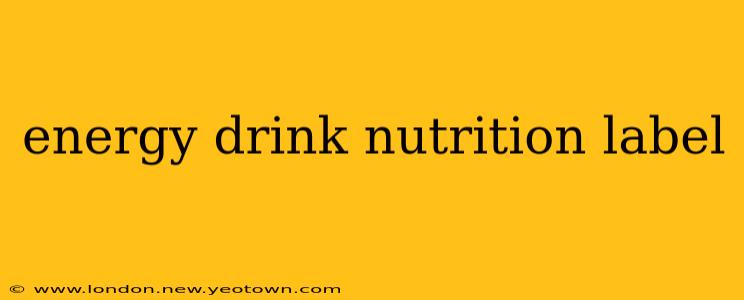The vibrant colors and bold graphics of energy drink cans scream excitement, promising a surge of energy and focus. But before you crack one open, let's take a closer look at the often-overlooked component: the nutrition label. Understanding what's really in your energy drink can make all the difference in making informed choices about your health and well-being. This isn't just about calories; it's about understanding the potential impact of the ingredients on your body.
What are the main ingredients in energy drinks?
This is a crucial question, because energy drinks aren't just sugar and water. They're a complex cocktail of ingredients, each with its own potential impact. The primary ingredients usually include:
-
Caffeine: This is the star of the show, providing the stimulant effect most people seek. The amount varies significantly between brands and sizes, and high doses can lead to anxiety, insomnia, and other adverse effects. The label clearly states the caffeine content (usually in milligrams).
-
Sugar: Energy drinks are notorious for their high sugar content, often in the form of high-fructose corn syrup or other added sugars. This contributes significantly to the calorie count and can lead to weight gain, tooth decay, and other health problems. Check the "Added Sugars" section of the label for a clearer picture.
-
Guarana: This is another natural source of caffeine, often added to boost the stimulant effect.
-
Taurine: An amino acid, taurine's role in energy drinks is still debated. Some research suggests it may help with athletic performance, but more research is needed.
-
B Vitamins: These are often included for marketing purposes, as they're essential for energy production. However, the amounts found in energy drinks are usually not significant enough to make a substantial difference in your overall vitamin intake.
How many calories are in a typical energy drink?
The calorie count varies dramatically, depending on the brand, size, and ingredients. A typical 16-ounce can can easily contain 200 calories or more, primarily from sugar. Pay close attention to the "Calories" section of the nutrition label and compare it to your daily caloric intake goals.
What are the potential health risks associated with energy drinks?
While the short-term energy boost can be tempting, the potential health risks of regular energy drink consumption are significant. Overconsumption can lead to:
-
Heart problems: The combination of caffeine and other stimulants can strain the heart, particularly in individuals with pre-existing conditions.
-
Anxiety and insomnia: Excessive caffeine intake can disrupt sleep patterns and lead to anxiety and nervousness.
-
Diabetes: The high sugar content increases the risk of developing type 2 diabetes.
-
Dental problems: The high sugar content contributes to tooth decay and erosion.
-
Dehydration: Energy drinks can have a diuretic effect, leading to dehydration if not balanced with adequate water intake.
Are there any healthy alternatives to energy drinks?
Yes! Fortunately, there are many healthier ways to boost your energy levels without resorting to the potentially harmful effects of energy drinks. These include:
-
Water: Staying properly hydrated is essential for energy and overall health.
-
Fruits and vegetables: These provide natural sugars and essential nutrients.
-
Coffee or tea: These offer a natural caffeine boost without the added sugar and other potentially harmful ingredients found in energy drinks.
-
Regular exercise: Physical activity helps regulate energy levels and improve overall health.
-
Adequate sleep: Getting enough sleep is crucial for optimal energy levels.
Are there any energy drinks with less sugar?
Some brands are now offering energy drinks with lower sugar content or sugar-free options. However, always carefully examine the nutrition label and ingredient list to ensure you're choosing a healthier alternative. Be mindful that artificial sweeteners may be used as replacements for sugar.
How much caffeine is considered safe in an energy drink?
The safe level of caffeine intake varies from person to person depending on factors like body weight, health conditions, and caffeine tolerance. It's always advisable to consult with a doctor or healthcare professional for personalized recommendations. Pay attention to the milligrams of caffeine per serving on the nutrition label and moderate your consumption accordingly.
By carefully examining the nutrition label and understanding the potential health implications of energy drink consumption, you can make informed decisions that prioritize your well-being. Remember, moderation is key. A healthy lifestyle, encompassing regular exercise, balanced nutrition, and sufficient sleep, is a far more effective and sustainable approach to achieving sustained energy levels.

